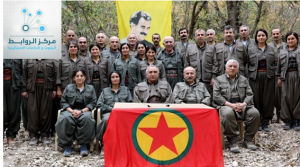The PKK was and still one of the social concerns of the Turkish state. This concern escalated with the assassination of the Turkish deputy consul in Erbil last July.
With this assassination, the Turkish government, through its security and military services, began tracking the PKK elements in Erbil and the Sinjar mountains and its Makhmur camp .It also intensified its activity in knowing the sources of funding the PKK and its offices in Sulaymaniyah, Erbil, Kirkuk and some villages on the outskirts of Sinjar and the outskirts of the Qandil Mountains.
It is worth mentioning here, that the strength of the PKK has doubled significantly, as its presence expanded in the Kurdistan region and Kirkuk, in the latter some projects in the era of the former governor were the share of companies that are close to him, and the former Iraqi government allocated monthly salaries to a few thousand of its fighters in addition to supplying it with various weapons, the party also enjoys Kurdish sympathy with two sides political in Sulaimaniyah and a military in Qandil and Sinjar.
And in front of this force , the federal government in Baghdad and the Kurdistan Regional Government are unable to confront it. The party is stronger than both, and therefore Turkey can not rely on them only in any treatment towards the party, but it needs intelligence cooperation with Iran, especially in the Iraqi-Turkish – Iranian triangle, on the other hand, the party realized that the assassination of the Turkish deputy consul in Erbil will have consequences, so it has worked to change its security and funding methods within the region and Kirkuk.
There is a fact that must be emphasized when dealing with the PKK , as the days go by, the PKK is getting stronger in a highly volatile region, when Washington turned a blind eye to it, in other words when it implicitly helped to build it, it has been able to establish armed branches in “PJAK” in Iran, “SDF” in Syria and “Protection Units of Sinjar”, which is the Iraqi arm of the Turkish Kurdistan Workers ‘ party (PKK) , and its members have been trained by the party, and have a better weapons arsenal than other militias, and its members receive salaries from Baghdad monthly as they are administratively affiliated with the Popular Crowd , but intellectually and ideologically are linked to the PKK.
With this military power, military solutions alone may not be feasible, but costly to all. Politically, the party has been able to establish political parties to represent it in other countries. These countries think that they can use the party to threaten one country or another as a pressure card in their hands but as a matter of fact , it is the party that uses these countries to achieve its interests.
Previously, Syria and Russia provided the party with all forms of military and financial support, and Iran provided it in different times and Kurdistan regime as well, with the exception of the Turkish state, which has been seeking since its inception to get rid of it , and currently due to the security threat imposed by the party to the countries where it active and the “bill” of its support has become so expensive that countries are trying to get rid of it.
Not to get rid of it means to extend its security and economic control over the border villages, according to observers, the PKK currently has more than (30) headquarters in the city of Sinjar and the villages and other areas around it, most notably Bara and Sununi and Khan Sour, Cordoba, Ain Fathi and Kursi as well as Jabal Sinjar, pointing out that it is involved in the smuggling of Syrian oil from border areas with Iraq, in cooperation with Mafia and networks of oil trade in the Kurdistan region of Iraq, which in turn deal with the Turkish and Iranian parties .
Observers also see that there are parties that do not want Baghdad to eliminate the presence of the party’s militants, as the Iraqi army can crush it within days, and force it to return from where it came by using aerial bombardment and ground movement, but the Iranians do not want it now, and their file specifically with the Revolutionary Guards and not Iraqis. They continued to say that the Turks have been pressing Baghdad for years to address this issue, and it came to a bargain to increase Iraq’s share of the waters of the Tigris, and withdraw the Turkish camp in Bashiqa if Baghdad expelled them, but the issue is linked to the desire of parties within Iran to keep them inside Iraq.
They revealed the existence of entire areas between Dohuk in the Kurdistan region, and the Turkish border outside the federal state authority and the Kurdistan Regional Authority, and there are no Iraqi forces, and ruled by the militia of the Kurdistan Workers for years, and there are militants of the Kurdistan Workers in northern Iraq, over an area of more than (7000) It has wide influence in other areas outside it.
The Middle East is experiencing severe political polarization as a result of political axes; every axis is trying to impose its vision on the region, a Turkish-Qatari axis, and a Saudi-Egyptian-Egyptian axis. The contradiction between these two axes is reflected in their vision in identifying the sources of security threats in the Middle East .The first axis sees the PKK as one of the original sources in threatening the security of the region, while the second does not see it, and may provide diplomatic, financial and military support to it, the process of getting rid of the PKK in the middle of this contradiction is very thorny issue .
Iraqi Studies Unit
Rawabet Links Center for Research and Strategic Studies

